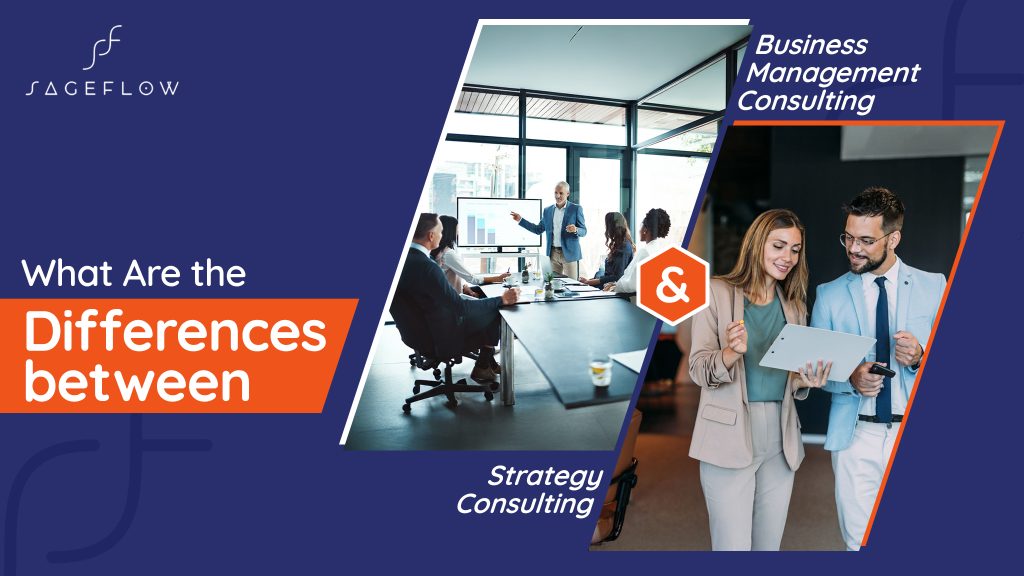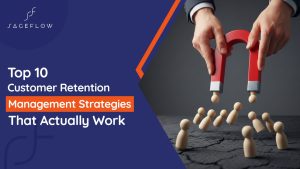Are you lying awake at night, concerned about slow growth and persistent inefficiencies in your business? You’re not alone. Of all the business managers who participated in a McKinsey survey, 70% reported feeling stuck when they reached performance plateaus or strategic dead ends.
The signs are all too familiar—shrinking margins, alienated employees, missed opportunities, and that sinking feeling of your competition passing you by while it feels like you’re going nowhere.
It becomes worse when you know you require assistance but do not know the place to go to:
- Do you employ a management consultant to repair the grind of everyday life?
- Or a strategy consultant to help define your long-term direction?
This option often surprises most leaders, and if mishandled, the cost can be steep. Even Fortune 500 companies, which spend billions on hiring consultants, fall victim—60% of those attempts fail because the wrong type of help was hired.
The wrong consultant has a ripple effect: blown deadlines, misaligned teams, and stalled decisions—all while the competition presses ahead full steam. Others freeze completely, stuck in analysis paralysis, and let problems accumulate until they’re too massive to handle.
This is the reality: Management consultants are your best bet for optimising operations and increasing efficiency. Strategy consultants help you prepare for change, outmanoeuvre the market, and develop a long-term strategy.
Combine both management consulting and strategy consulting, however, and you’re fixing a strategic issue with a tactical solution—or vice versa—and that doesn’t typically work out. Worse yet, companies that misalign their requirements with the wrong consultant see as much as 40% less in their ROI. They experience longer project duration, greater expenses, and sometimes end up back at square one.
That’s where this guide steps in. It’s your no-nonsense, all-transparency guide to:
- Having an understanding of precisely when to use which kind of consultant,
- Identifying warning signs and specific business pain areas,
- And confidently judging a consultant’s real abilities,
Helping to identify the warning signs and specific business pain points, and confidently assessing a consultant’s actual abilities. Whether you are a CEO at a crossroads, a department leader at a dead end, or an aspiring entrepreneur looking to scale, this blog guarantees that you hire the right expert the first time, converting your consulting dollars to actual business change; not an expensive error.
What Is Management Consulting?
Management consulting is a broad category that assists organisations in enhancing their overall performance across various fields. Management consultants are expert advisers who go deep into your business operations to diagnose problems, create solutions, and implement them.
They also provide an outside perspective, along with expert knowledge acquired by serving many organisations across various industries. They analyse your existing processes, systems, and organisational structure to identify inefficiencies and opportunities lost.
Management consulting encompasses a broad range of business functions, including human resources, finance, operations, and technology. While specialists focus on a single aspect, management consultants view things holistically, understanding how various components of your business interrelate and impact overall performance.
The primary objective of management consulting is to effect permanent changes that continue to yield dividends years after the consultants have departed. They do not only offer suggestions – they work with your company to do it right and teach you how to do it.
Management consultants usually work on longer engagements that take months to years. They can develop a thorough understanding of your company’s culture, issues, and goals, and establish strong relationships with key decision-makers at all levels, thanks to this extended period.
Core Domains of Management Consulting
Management consultants excel at optimising efficiency in your operations by identifying bottlenecks in your processes. They streamline processes and eliminate waste to maximise productivity across your entire organisation.
Organisational development is also one of the key strengths of management consulting. They assist in restructuring departments and teams, and emphasise enhancing communication and the effectiveness of leadership across your organisation.
Technology implementation is increasingly essential in today’s digital landscape. Management consultants guide digital transformation projects and ensure new systems integrate smoothly with existing processes, minimising disruption to daily operations.
Change management is necessary when implementing new processes and technologies.
Management consultants assist your employees in embracing these changes, minimising resistance and optimising adoption rates across every department in your company.
Performance management systems are the vehicle for ongoing improvement. Management consultants develop metrics and KPIs to measure progress and establish reporting systems that give decision-makers actionable information for enhanced decision-making.
Management consulting is an end-to-end process for business improvement. Consultants typically have longer-term assignments that take several months or even years.
What Is Strategy Consulting?
Strategy consulting is all about developing high-level business strategies and plans that determine your company’s destiny. Business strategy consultants help companies make informed decisions about their future by providing analytical models and strategic guidance that drive long-term success.
These C-suite-level consultants work directly with board members and C-suite executives to tackle your most difficult strategic challenges. They apply a blend of analytical acumen, industry knowledge, and strategic acumen that enables leaders to make well-informed decisions in a world of uncertainty.
Strategy consulting is really about responding to the big questions that set the direction of your business. Do you go into a new market? How do you react to disruptive competition? How do you best allocate resources across disparate business units? These are the kinds of strategic questions that strategy consultants respond to.
The task involves in-depth research, data analysis, and the collection of competitive intelligence to understand market forces, industry trends, and customer preferences. Strategy consultants summarise this information in actionable recommendations that are aligned with your company’s strengths and goals.
In contrast to other types of execution-based consulting, strategy consulting is more about direction and positioning. Deliverables would include strategic frameworks, market analysis, competitive analysis, and top-level roadmaps that inform decision-making at the top of your organisation.
Strategy consulting assignments are shorter in duration but more intense than management consulting assignments. The tone is directed towards quick analysis and recommendation, typically completed within 2-4 months, enabling firms to make prompt strategic decisions.
Fundamental Role of Strategy Consulting
Market analysis serves as the foundation for informed strategic decisions. Industry trends and competitive landscapes are analysed by strategy consultants to identify opportunities and threats to your market, including the understanding required for making informed strategic decisions.
Strategic planning is the core of strategy consultancy services. These consultants formulate long-term business strategies that set specific objectives and develop elaborate blueprints to accomplish them, ensuring your business has a well-defined roadmap for long-term growth.
Business model innovation enables firms to respond to shifting market environments. Strategy consultants help firms refine or adapt their business models to identify new revenue streams and capitalise on market opportunities that provide a competitive edge.
Mergers and acquisitions need to be implemented by experts. Strategy consultants analyse prospective transactions and integration plans, including thorough due diligence and post-merger planning to optimise value creation.
Building growth strategies entails growth opportunities that will work to your advantage. Strategy consultants identify growth strategies for entering new markets or launching new products, aiming for sustainable and profitable growth.
Corporate strategy unites all business units towards shared goals. These consultants harmonise divergent departments and divisions with corporate-wide goals, developing synergies that maximise organisational efficiency.
Strategy consulting projects are typically shorter but more concentrated. They are intended to address a specific strategic challenge throughout a couple of months.
Why Do Businesses Employ Both Strategy Consulting and Management Consulting Companies?
Now that you see what each kind of consulting has to offer, you may be wondering why firms would pay for outside consultants to begin with. Most firms have capable in-house staff and seasoned management, after all.
It’s not a matter of not having internal capacity – it’s a matter of tapping into specialised skills and outside viewpoints to drive faster results. Firms engage consulting companies for a variety of good reasons.
1. Access to Specialised Expertise
Consultants also possess deep industry and functional expertise. They’ve done it before with similar firms and know what works. It would be costly to do it themselves.
2. Objective outside View
Employees often develop blind spots over time. Consultants bring fresh eyes and unbiased analysis. Consultants can identify problems that employees may not notice or acknowledge.
3. Resource Augmentation
Most firms lack the internal resources to handle large tasks. Consultants offer more qualified people without ongoing employee expenses. It is beneficial for single projects.
4. Accelerated Implementation
Consultants possess established methods and frameworks. They can deploy solutions more quickly than internal staff, which must learn from scratch. This time, the benefit generally outweighs the investment.
5. Risk Mitigation
Effective consultants understand what works and what doesn’t. They prevent businesses from costly mistakes and unsuccessful ventures. This risk reduction is well worth it.
6. Change Facilitation
Consultants can push through tough changes that internal leaders are unable to make. They bring in outside authority and credibility for change.
Differences between Management Consulting and Strategy Consulting
You now know why businesses use both management consulting and strategy consulting and what each type has to offer. But the question of the day remains: what kind of consulting does your business need?
The decision is based on your particular challenges and goals. The wrong decision results in misaligned expectations, wasted resources, and disappointing outcomes. Knowing the differences between strategy and management consulting assists you in selecting the proper consulting partner:
Scope and Focus
- Strategy Consulting: Concerned with high-level strategic questions and general planning. Strategy consultants offer solutions to “Should we enter that market?” or “How do we compete with this competitor?”
- Management Consulting: Addresses more general operations and organisational issues. Management consultants address topics such as “How do we get more efficient?” or “How do we implement this new system most effectively?”
Project Duration
- Strategy Consulting: Projects usually take 2-4 months. There is an emphasis on quick analysis and the formulation of recommendations.
- Management Consulting: Projects typically take 6-18 months or more. Implementation and change management take longer.
Engagement Level
- Strategy Consulting: Operates mainly with the C-suite executives and senior management. It presents the recommendations to top-level decision-makers.
- Management Consulting: Involves interacting with multiple organisational levels. Consultants interact closely with middle management and operational teams.
Deliverables
- Strategy Consulting: Develops strategic advice, market reports, and high-level roadmaps. Deliverables are of direction and positioning.
- Management Consulting: Develops comprehensive implementation plans, process documentation, and operating frameworks. Deliverables are results and execution-driven.
Problem-Solving Method
- Strategy Consulting: Employ analytical methods to resolve strategic challenges. The process is more conceptual and forward-thinking.
- Management Consulting: Entails practical, no-nonsense problem-solving techniques. The style is more action-focused and tactical.
Cost Structure
- Strategy Consulting: Typically charges a higher day rate because of specialised knowledge. Projects are briefer in time but more concentrated.
- Management Consulting: Day-to-day costs are lower, but projects tend to be longer in duration. The average project cost is similar to or higher than that of strategy consulting.
Relationship Type
- Strategy Consulting: Typically consists of defined projects with clear beginnings and endings. It can be more transactional.
- Management Consulting: Typically evolves into more long-term engagements. Ongoing support and follow-up projects are typical.
Skills Needed
- Strategy Consulting: Demands a sound analytical mind, industry expertise, and strategic planning abilities. Consultants must be able to synthesise fast.
- Management Consulting: Skills in project management, change management, and implementation. Several teams require the assistance of consultants.
When to Use Each Type?
Having now established the importance of selecting the right kind of consultant, let us proceed to the in-the-trenches guidelines that will inform your choice. The key is to accurately diagnose your existing organisational issues and pair them with the associated consulting expertise.
The following choice model has been tested through hundreds of consulting assignments and consistently helps business leaders avoid costly misalignments. By carefully examining your specific situation with these benchmarks, you’ll be able to make an informed decision about whether your organisation needs strategic guidance or operational tuning.
Select Strategy Consulting When:
Strategy consulting is most effective when you need to make significant strategic decisions that will shape the long-term direction of your business. They are substantial decisions that require thorough market analysis and strategic planning to ensure long-term success.
Utilise strategy consulting when entering new markets or adopting new business models. These growth opportunities require careful analysis of market conditions, competitive landscapes, and potential returns on investment.
You need strategy consultants when you are confronted with intense competitive threats that can affect your market position. They help you understand the competition’s strategies and develop countermeasures to protect and strengthen your market position.
If mergers and acquisitions are on the horizon, strategy consulting brings the expertise to review deals, perform due diligence, and manage successful integrations that add value to your company.
Strategy consulting is ideal when you require in-depth market research and analysis to inform your critical business decisions. These encompass knowledge of industry trends, customer attitudes, and new opportunities.
Leadership alignment with strategic direction typically requires external facilitation. Strategy consultants help executive teams align with shared goals and ensure everyone is clear about the direction ahead.
Select Management Consulting When:
Management consulting is the appropriate option when you are faced with operational inefficiencies that are affecting your bottom line. These consultants identify bottlenecks, streamline processes, and develop solutions that enhance productivity and reduce costs.
Technology installations and system upgrades need specialised knowledge to be successful. Digital transformations are led by management consultants who ensure that new technologies are smoothly incorporated into existing processes and that return on investment is optimised.
Management consulting skills are beneficial in organisational restructuring efforts. These experts assist in redesigning organisational structures, enhancing communication flows, and improving leadership effectiveness at all levels.
Large-scale change programs must be well-planned and implemented to succeed. Management consultants provide the frameworks and advice necessary to lead change effectively, reduce resistance, and accelerate adoption.
Process and workflow optimisation are essential management consulting capabilities. They analyse your existing processes, pinpoint areas of improvement, and implement solutions to drive efficiency and quality.
Performance management systems must be continually monitored to function effectively. Management consultants implement measures, design reporting systems, and establish accountability systems to ensure ongoing improvement.
Take the First Step towards Business Success with SageFlow Consulting Services
Ready to revolutionise your business? SageFlow Consulting provides management consulting and strategy consulting services tailored to meet your company’s specific needs.
What Sets SageFlow Apart:
Their consultants have experience working with Fortune 500 companies and understand the industry-specific challenges you face. They apply proven approaches that produce tangible results, not recommendations. Each solution is tailored to fit your circumstances and goals. They collaborate with your personnel to provide knowledge transfer and sustainable results that endure.
SageFlow offers strategic planning, operational excellence, digital transformation, change management, performance improvement, and business model innovation. Don’t let uncertainty stop you. While others are gaining ground, you are likely to be growing.
Ready to Stop Guessing and Start Growing?
SageFlow has assisted over 200 Australian companies in overcoming growth obstacles. They will examine your case and advise you precisely what you require – no guesswork, no unnecessary investment.
What’s next: Free 30-minute strategy session, personalised roadmap, and guidance from consultants with experience in the Australian marketplace.
Book Your Free Consultation at SageFlow.
Stop running around in circles. Start seeing results. Your business breakthrough is just a conversation away.







